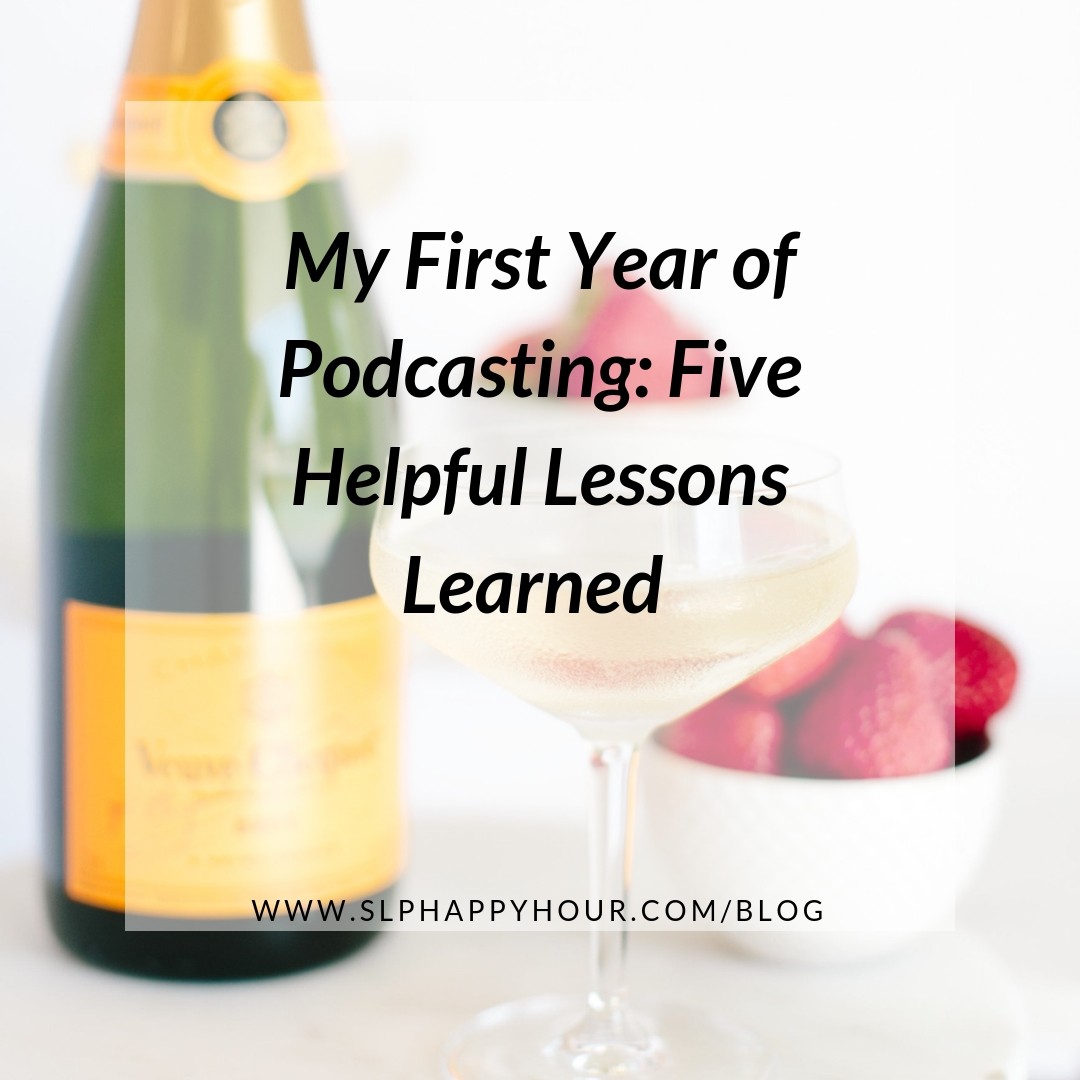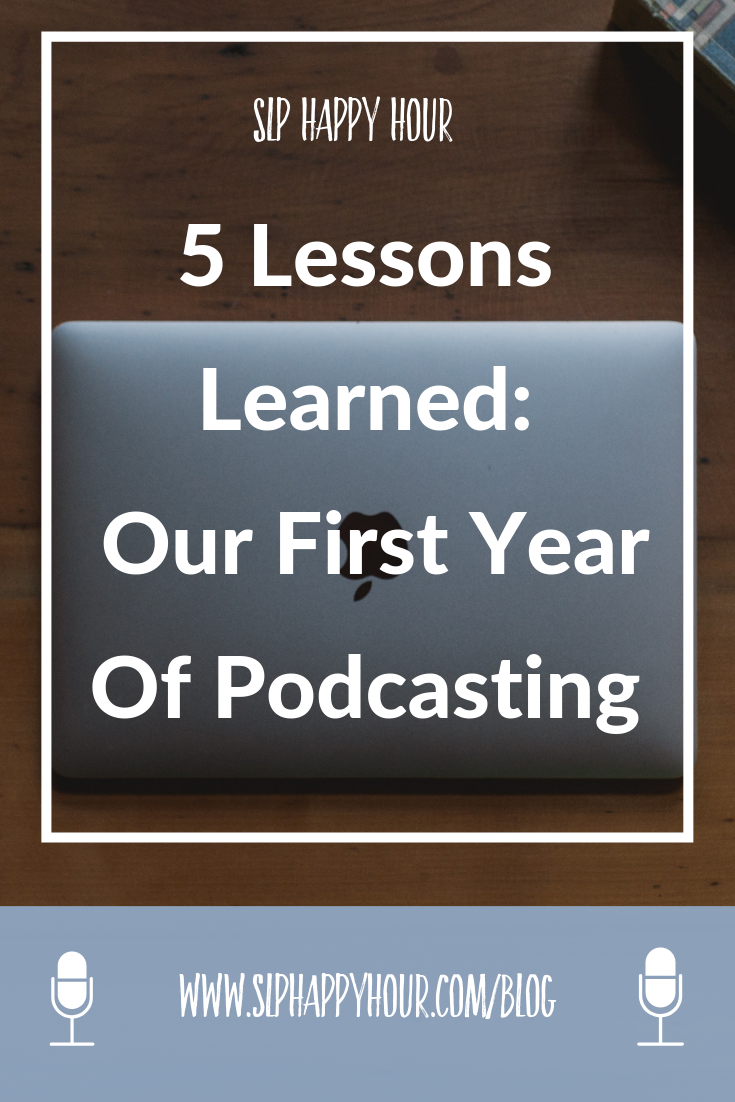The SLP Happy Hour podcast is just about one year old.
I remember my ideas about podcasting before I started: I’ll be more visable online (I was a bit nervous about that part), I’m not sure if anyone will listen, it sounds like hard work, I know the podcast won’t be for everyone…
For me a big part of getting things started was just going for it. Did I know how it was going to turn out? Absolutely not! But I’ve absolutely enjoyed the process.
As I reflect on my first year podcasting, I want to share some of my thoughts about the process and what I’ve learned. I hope this helps you get a peek into what podcasting is really like, as well as some of the lessons I’ve learned along the way.
1. Editing is hard work!
Editing just one podcast episode can take a long time - anywhere from 30 minutes to one hour. If you are considering podcasting, it would be worth your time to learn either Audacity (it’s what we use to edit) or Garage Band (if you have a Mac), or to start gathering a budget to pay someone else to do your editing. You can read more about this process (and podcasting fundamentals) in this post.
What have we learned to help the process go more smoothly?
Shorter episodes are easier and quicker to edit, and we’ve found interview episodes take significantly longer to edit. Because of that, we are mindful of how many interviews we do on the show from here on out.
2. The Work is 80% behind the scenes and 20% on stage (or rather, on the air)
There is a lot that goes on behind the scenes for a podcast, more than I expected.
Very little of what I do for the podcast is “on stage” (recording actual episodes). In fact, most of it is behind the scenes.
This is probably true for any SLP side hustle. For the podcast, things that happen behind the scenes can include:
- writing monthly blog posts
- managing the store
- writing show notes for the website
- creating graphics for each episode to post on social media
- managing our social media accounts
- checking and responding to our email account
- writing and sending a monthly newsletter
- creating topic ideas for the blog and podcast
- coordinating interviews for podcast guests
- editing/sound production
...and more!
Overall, I really enjoy writing, marketing, and social media. Although the work is fun, it takes many hours each month. Did I have to do a blog and website? No. Even so, it is worth it. For me, the decision to do so was based on wanting to be as “findable” online as possible.
Why is it so important for me to be finable online? Well, I remember what it was like to need to hear the sort of things we say on the podcast. In fact, this podcast really is exactly what I needed to hear earlier in my career. I didn’t hear those things being said online, so I started the podcast, and started talking. I remember what it was like to be an overworked and isolated SLP, and I wouldn’t wish that on anyone! Because of that, I want as many SLPs as possible to know about the podcast, to discover if it’s something that could be helpful to them. Having a website, show notes, and blog all contribute to making us easy to find online. Because of that, it’s worth all the hard work.
3. You’ll get an onslaught of interview requests
When we started doing interviews, I started to get quite a few interview requests. Over time, this started to feel a bit overwhelming. The challenge here is that we’ve tried to limit our interviews, and to be a primarily co-hosted show. In reality, there are great SLP interview shows out there already.
Instead, our format includes segments focused on being more productive, efficient, calmer, and happier in the profession. The strength of our show is our focus, and it’s what makes us different. I really appreciate the conversations Sarie and I have had as we open up about what’s difficult in our work lives, and what we are doing to make it better. Those types of conversations haven’t existed in the SLP podcast space, so that is what I’m trying to cultivate.
I’m still figuring out what to do with interview requests. For now, we are booked with interview guests for 2019. For us, we are topical - meaning we cover a specific topic each episode - so we usually choose guests who can speak on specific topics. We aren’t an interview show, and we don’t do many interviews. Overall, we plan for about 30% of our total shows to be interviews. That means when people approach us to be on the podcast to talk about their book/product/service, the answer is almost always no.
I do plan on doing a blog post in the future on how to get on a podcast. For now, my best tip is to remember to think about how your knowledge can help the podcaster’s audience. Frame your pitch from the listener’s perspective (and what you can teach), and not what you want to sell or promote.
Some of the interviews I’m most excited about doing in the future are with people I searched for in order to discuss a certain topic. I approached them, they didn’t approach me. For example, I’m currently in talks to interview a former SLP who left the profession to become a successful mystery novelist (!). That should be a fantastic episode, but I had to seek out that interview and find the right match.
Although interviews are tricky, some of our most memorable experiences podcasting have been doing interviews. Interviews may be less frequent in the coming year - but they aren’t going anywhere!
4. Sometimes, you have to do the job over again.
Our first episode is our most popular episode. What most people don’t know is that we had to re-record it at least 3 times in order to get it just right. In fact, I actually have lost count of how many times we did it over again.
Why? Firstly, we needed to learn how to use our podcasting equipment. Secondly, Sarie and I needed some time to figure out our podcasting style, how to interact/have rapport with each other for the podcast, and how to make our segments as organized and as helpful as possible.
To further add to our mistakes, since then we’ve had a few episodes where the microphone wasn’t recording (and the laptop microphone was recording instead, resulting in poor audio quality), or where the audio file got lost or damaged in the editing process. I’m happy to say we usually had a pretty good attitude about these instances, and we’ve considered it a part of the learning curve, and a chance to make the episode even better.
5. You’ll make new friends.
I’ve made so many connections during my time as a podcaster. I’ve made at least a dozen internet friends, who I’m excited to meet this month at the ASHA conference. By being a part of the podcast and having a social media presence, I’ve met new SLP friends who I genuinely care about and respect.
How did these relationships begin?
If you are looking for tips to connect with other SLPs online, my best advice is to be helpful. When the first thing someone asks me for is information/a request/to feature them on our podcast or social media, it feels a bit like a one-way transaction. That’s not why I’m in the social media game. Reach out with your commonalities and offer resources or ideas when they are asked for. Comment on their posts. Be the kind of person you’d want to be around in the social media space, and see what happens.
What’s Next?
I hope this article was helpful as you learned about my experiences in my first year of podcasting. January will mark our one-year podcasting birthday, and I’m so proud of what we’ve created. Thank you for being a part of the journey.
Moving forward, Sarie and I will be taking a podcasting break until January 2019. During that time, we won’t be coming out with new episodes.
If you are a listener, this is a great time to get caught up on SLP Happy Hour episodes you haven’t listened to yet!
What will we be doing during the break?
This will be a time for Sarie and me to really refine our vision for the podcast and create a plan for our next year of podcasting. This will include topics for next year, how we’ll handle interviews, and ways to make our overall process more efficient and spend time where it matters most. I’ll also be mapping out blog posts for 2019 as well as focus areas for social media (and taking photos).
By going into low power mode, we’ll have extra time and bandwidth to get our creativity flowing and create some great content for the upcoming year.
Further Reading
If you want more from us, you can listen to all podcast episodes here.
You can also subscribe to our monthly (or so) newsletter. I typically send out a newsletter with behind-the-scenes information and a freebie once a month, but may send out an extra email here and there whenever we’ve got big podcast news (or an awesome freebie).
Wherever this time of year finds you, I hope you’ve got a chance to turn down the dial into low power mode too, and take time to get some activities done that are truly meaningful to you.


